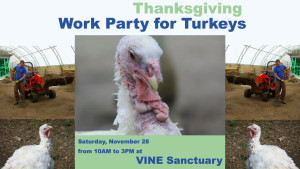Since the festival of carnivorous gluttony known as Thanksgiving followed by the carnival of consumerism known as Black Friday offer a case in point of the intersections among colonialism, capitalism, animal exploitation, and environmental degradation, I’ve often published essays looking at those links. “Re-Membering Thanksgiving” (2004) considered the question in the context of the U.S. attacks on Iraq:
“Body parts are everywhere!” That’s what one US soldier had to say about the saddest city in Iraq, according to an AFP report. It’s also an apt description of the state of US dinner tables during the festival of gloating and gluttony known as Thanksgiving.
Similarly, “Conquistadors of the Senses” (2006) linked homophobia to consumerism, by way of colonization and factory farming:
The Puritans whose survival is celebrated every Thanksgiving, like the Conquistadors of the Caribbean, often imposed the death penalty for homosexuality.
Anti-gay referendums are just one of many legacies of the European invaders. Historian Alfred Crosby has written that “one who watched the Caribbean islands from outer space during the years 1492 to 1550 or so might have surmised that the object of the game going on there was to replace the people with pigs, dogs, and cattle.” Today, factory farms in which hundreds, thousands, tens of thousands, and even hundreds of thousands of animals are confined litter the landscapes of the Americas. Their effluents poison our water while the carbon dioxide and methane released by their operations are among the chief causes of climate change.
The conquest of the senses continues…. Gluttony of all kinds has replaced the natural pleasures that have been suppressed. Estranged from their own bodies, Americans have an insatiable appetite for the bodies of others, conveniently converted into objects for consumption by butchery or pornography.
Because of such connections, we’ve always encouraged sanctuary supporters to use the days after Thanksgiving for something other than shopping. In 2003, we urged people to “Buy Nothing for the Animals,” offering a list of more nourishing activities, including volunteering at animal shelters or sanctuaries. In 2012, we renewed that call, reminding everybody that “consumerism (which substitutes plastic objects for our most heartfelt animal desires, impoverishing us while enriching capitalist profiteers) [is] one element of the matrix of intersecting oppressions that diminished our lives.”
This year, we’re going a step further, by opening the sanctuary on the Saturday after Thanksgiving to anyone who would like to come for a day of volunteer labor capped by conversation and vegan treats.
If you live near enough to us to join the fun, please RSVP via the Facebook or Evite event pages. If you can’t make it to our event, check to see if a shelter or sanctuary nearer to you could use some post-Thanksgiving labor.
Whether you do that or any of the other activities we’ve recommended in lieu of shopping, please do think about donating some of the money you save to a nonprofit organization. For our part, we’re still looking for help stacking our Winter Hay Fund, and I personally am asking folks to help me thank the hardworking animal care staff here at the sanctuary by making contributions to the general operating fund from which we pay wages.
PS — This isn’t meant to discourage folks who use holiday sales to save money on things they need and would have bought anyway (though we do hope that anybody who shops over the Thanksgiving weekend will be mindful of the second annual #BLACKOUT Black Friday boycott by choosing independent and Black-owned businesses rather than big box stores.) This is about resisting the enticement to squander hard-earned funds on unnecessary products that deplete the environment along with your pocketbook, all in the service of amoral profiteers. This is about finding much more substantial pleasure in volunteer work or playful activities that contribute to your own well-being while helping to heal our communities and ecosystems.





(http://veganelder.blogspot.com/2015/11/instead-of-shopping.html)
It is crucial that we work at interrupting the “normal” harm that we do.